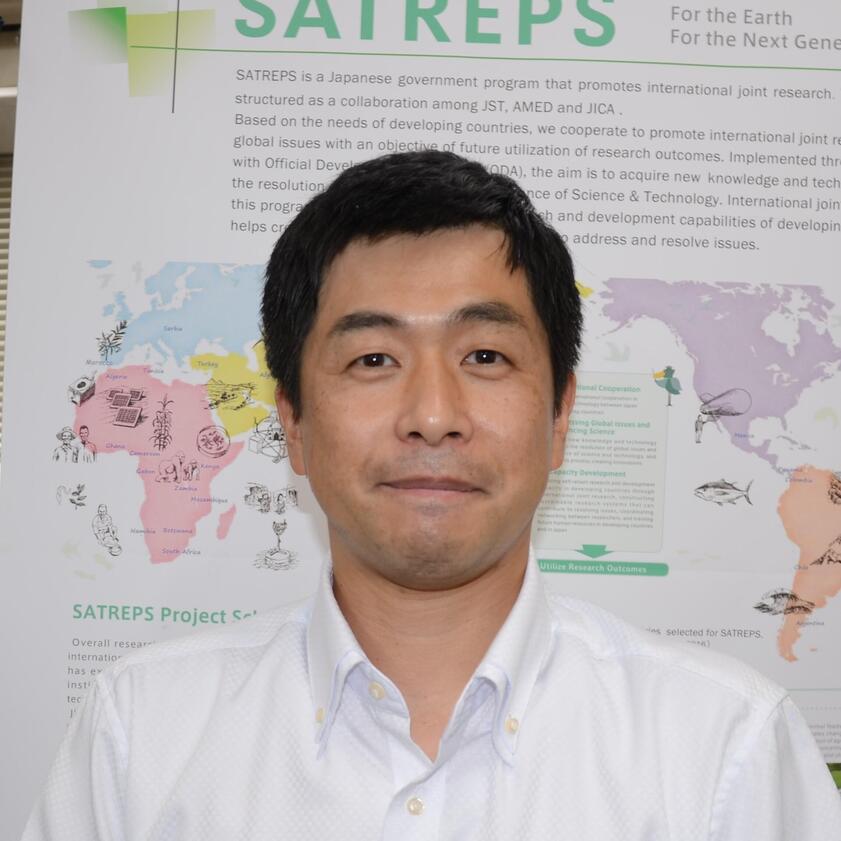Professor Ryuichiro Higashinaka

Researchers'
Assistant Professor
Hideki Kanda
Graduate School of Engineering
This is a quote by Yasuzaemon Matsunaga, who was a famous business leader and founded the private R&D institute, where I used to work. Nowadays, it is so hard to challenge something daringly because the society is not so tolerant of failure. However, not only the society but each of us needs to challenge then change itself and ourselves to survive the society which has been changing rapidly due to artificial intelligence (AI) and other technologies. Unfortunately challenging sometimes brings failure. Of course, although I don't want to face failure either, when I mess up, I keep challenging, believing that its experience makes me much tougher.
My research topic is about the methods of converting materials without using toxic chemicals. In details, the purpose is to do the extraction separation or produce inorganic and organic composite materials using harmless substances such as carbon dioxide, water, and dimethyl ether (DME) which are high-pressured or in plasma. We are currently facing challenges in various fields such as biofuels, biomaterials for regenerative medicine, highly functional nanoparticles, and natural dyes for food.
When I graduated from the university, the job market was so bleak that I couldn’t choose my job. Therefore, I started to work at the company that was not the same as my specialty at the university. Even while I worked there, I continued my own study which I had done at the university as a hobby on my private time. Then I wanted to use my idea in the job at work and started thinking to make it a planning of my job. Through some planning meetings it had changed quite different, however, I was lucky to obtain the grant from the government because there were few competitors in my field, then I started to research at Nagoya University.
In the private sector, the most important point is that how much the R&D is consistent, profitable, and feasible with its business policies. Although the content of the research in detail is improved through the review process, it takes long time, moreover, it cannot be stopped once it starts. In addition, the better results, the more restrictions to publicize it. Even though it took eight years to publish my paper in my case, it was still relatively faster. On the other hand, at universities, these restrictions are laxer than those of the private sector and it is flexible to challenge some ideas that are not planned on the way, but meanwhile, it is difficult to feel really what the society needs currently. In addition, there are some cases that the studies are considered too academic and difficult to implement in private sectors, but at a university they are deemed so practical that they are not suitable for graduation or master’s thesis.
I did all the experiments by myself while I worked for the private sector so I was enjoying being the very first person to see the result by my own eyes or coming up with a good idea. Here, at the university, I am not only a researcher but also a mentor of students, I feel happy to see the students hitting upon their own ideas or working on them voluntarily. The ability to make their own goal then work through initiatively is one of the most important things in the society where AI is making rapid progress, therefore, I want students to acquire those kinds of skills through the research process.
The aim of our project is to produce biofuel, moreover, to reuse the residue as fertilizer by cultivating microalgae, a small plant species, outdoors using treated sewage water. The equipment developed by my laboratory is being exported to South Africa and installed there now. If we can produce biofuel within the amount of energy produced by microalgae through photosynthesis, it could be a revolutionary achievement. Since many people are involved in this project, it is very important to coordinate various aspects of the project. In addition, I sometimes visit not only the local government agencies but also the office of JICA and the Japanese Embassy in South Africa for consultations and procedures for construction, import and export, and tax issues. Moreover, there are extremely few Japanese in the area I work for but it seems that the local people there have a good impression of Japanese science, technology, and economy, thus Japan should have an interaction with Africa more and more.
I’d like to keep coming up with ideas as many as I can then keep facing challenges step by step; this may be different from the future goal. In addition to microalgae, as we are simultaneously conducting another research on quite different topics, it happens to come up with a very new idea or an idea in a different field by combining them. It is important that the results are linked to practical applications from the viewpoint of basic research so I will do my best as much as I can contribute to the society with my studies.
Name: Hideki Kanda
Department: Graduate School of Engineering
Title: Assistant Professor
Career history and hobbies:
Completed his doctoral studies at the Graduate School of Engineering, Kyoto University in 2000. He joined the Central Research Institute of Electric Power Industry (CRIEPI) in 2000; became a JST PRESTO researcher in 2011; an assistant professor at the Graduate School of Engineering, Nagoya University in 2012; and a JST/JICA-SATREPS representative in 2015. His hobby is walking with his children.